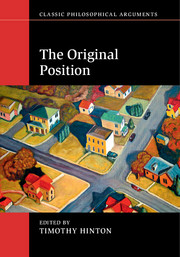Book contents
- Frontmatter
- Contents
- List of contributors
- Acknowledgments
- List of abbreviations
- Introduction: the original position and The Original Position – an overview
- 1 Justice as fairness, utilitarianism, and mixed conceptions
- 2 Rational choice and the original position: the (many) models of Rawls and Harsanyi
- 3 The strains of commitment
- 4 Our talents, our histories, ourselves: Nozick on the original position argument
- 5 Rawls and Dworkin on hypothetical reasoning
- 6 Feminist receptions of the original position
- 7 G. A. Cohen's critique of the original position
- 8 Liberals, radicals, and the original position
- 9 The original position and Scanlon's contractualism
- 10 The “Kantian roots” of the original position
- 11 Stability and the original position from Theory to Political Liberalism
- 12 The original position in The Law of Peoples
- References
- Index
3 - The strains of commitment
Published online by Cambridge University Press: 05 December 2015
- Frontmatter
- Contents
- List of contributors
- Acknowledgments
- List of abbreviations
- Introduction: the original position and The Original Position – an overview
- 1 Justice as fairness, utilitarianism, and mixed conceptions
- 2 Rational choice and the original position: the (many) models of Rawls and Harsanyi
- 3 The strains of commitment
- 4 Our talents, our histories, ourselves: Nozick on the original position argument
- 5 Rawls and Dworkin on hypothetical reasoning
- 6 Feminist receptions of the original position
- 7 G. A. Cohen's critique of the original position
- 8 Liberals, radicals, and the original position
- 9 The original position and Scanlon's contractualism
- 10 The “Kantian roots” of the original position
- 11 Stability and the original position from Theory to Political Liberalism
- 12 The original position in The Law of Peoples
- References
- Index
Summary
The parties in the original position “cannot enter into agreements that may have consequences they cannot accept. They will avoid those they can adhere to only with great difficulty … [W]hen we enter into an agreement we must be able to honor it even should the worst possibilities prove to be the case” (TJR, p. 153).
On some readings, these propositions are key to John Rawls's argument against utilitarianism in TJ. The principle of average utilitarianism has the potential to require that great deprivations – deprivations of liberty and material deprivations – be borne by some individuals for the sake of a greater sum of benefits to others. Anyone contemplating the choice of the utilitarian principle in Rawls's original position must take this into account and take into particular account that she may turn out to be one of those who will suffer deprivation of this kind. Utilitarianism, we know, is not constrained by any fundamental requirement that these burdens be tolerable at the individual level. But if there is a prospect of some people facing a requirement that they bear intolerable burdens, then the principle that generates such a requirement does not satisfy what Rawls calls “the strains of commitment” (TJR, p. 126), and the people in the original position must reject it. “Otherwise,” as Rawls puts it, they “have not acted in good faith” (TJR, p. 153).
The strains of commitment argument operates independently of whatever rational choice argument can be made in favor of a maximin approach to decisions made in the original position. According to the rational choice argument for maximin, it is not rational to choose any principle that will lead to outcomes that are worse for certain individuals than those resulting from the application of Rawls's two principles. Rationality requires risk aversion in the original position even if, statistically, a principle like average utilitarianism defines a better bet than Rawls's principles. But this rational choice argument for maximin is precarious and it is deprecated by most commentators. At worst it involves a question-begging stipulation of a risk-averse mentality for the parties in the original position. At best it relies on arguments about our inability to define rational choice for a single (one-off) bet that is supposed to shape one's life chances once and for all, as opposed to the open-ended series of bets that gaming rationality seems to presuppose.
- Type
- Chapter
- Information
- The Original Position , pp. 59 - 76Publisher: Cambridge University PressPrint publication year: 2015
- 1
- Cited by

